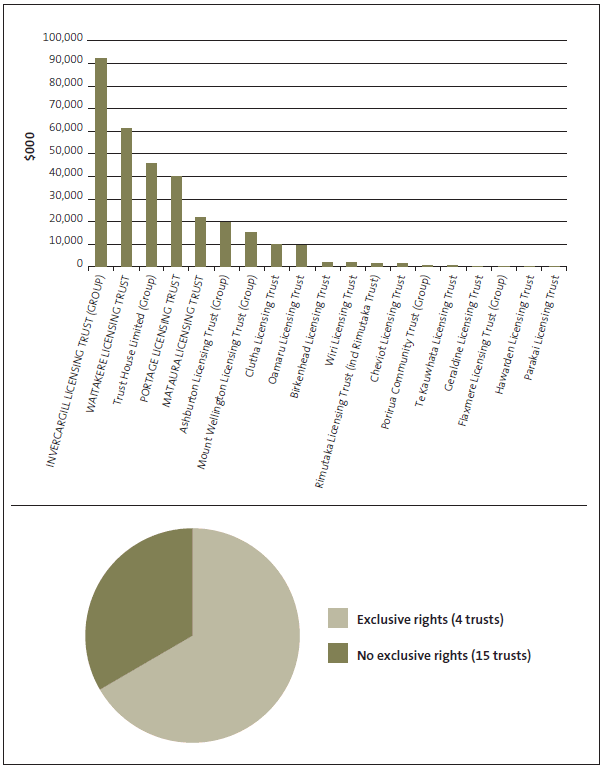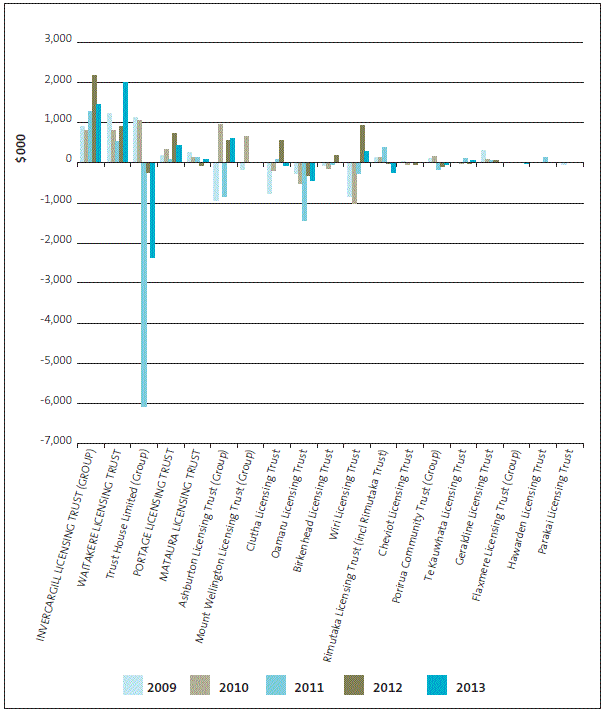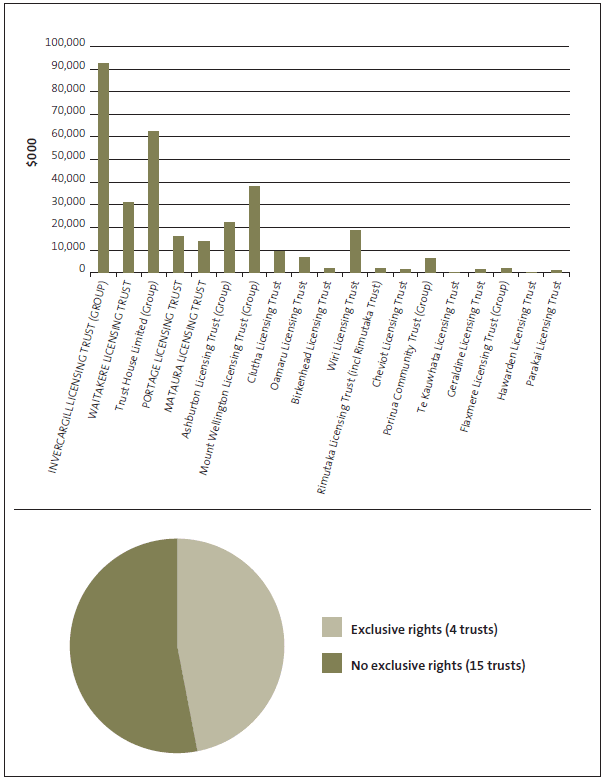Part 2: Overview of licensing trusts' operations
2.1
In this Part, we discuss the financial health of licensing trusts and provide two examples of the contributions that licensing trusts make to their communities.
Licensing trusts' financial health
2.2
We have been monitoring the financial health of licensing trusts for several years. Fourteen of the 19 licensing trusts have incurred losses in one or more of the five years to 31 March 2013. Many licensing trusts have struggled to maintain profitability since the 1990s. Some licensing trusts have incurred losses for several years. For these trusts, ongoing losses will become unsustainable.
2.3
Licensing trusts are starting to deal with these challenges. Some have begun to diversify to help improve profitability. For example:
- Mount Wellington Trust Hotels Limited (the operating company of Mount Wellington Licensing Trust) has successfully operated the Waipuna Hotel and Conference Centre for many years. To enhance and protect this business, it has recently started operating a second conference site in Highbrook, Auckland, using its existing conferencing expertise.
- Trust House Limited is re-assessing its operational base. It has sold five non-performing businesses.
2.4
Licensing trusts are also under pressure to return more funding to their communities to support community activities and develop facilities. The downturn of the economy has reduced the ability of many private enterprises to support community ventures.
2.5
As well as seeking to implement operational efficiencies and remove unprofitable activities, some licensing trusts have pursued other more innovative diversification strategies to increase profitability. These have included investments in hydro-electricity, social housing, and property development. We recognise that trusts have undertaken their own due diligence into diversified investments. However, we note that undertaking activities that are so different to the core competencies of a licensing trust is arguably risky. Good governance and management of such ventures is essential to ensure good outcomes for communities.
2.6
Figures 1 and 2 set out total revenue and total comprehensive income8 for licensing trusts, as reported in their 2012/13 audited financial statements.9 Figure 3 sets out total assets for licensing trusts in each of the five years to 31 March 2013, drawn from the same source. Licensing trusts' total comprehensive income measures their profitability, and the combination of their total assets and total revenue indicates their relative size.
2.7
In Figures 1, 2, and 3, the licensing trusts that are shown with all capital letters are those that have exclusive rights to operate hotels, taverns, and off-licences in their district. Figures 2 and 3 are ordered from left to right based on highest to lowest revenue, as identified in Figure 1.
Figure 1
Licensing trusts' revenue for the year ended 31 March 2013

Notes: The 2012/13 audited revenue figures are presented because, in general, the minimal revenue fluctuations during the five years to 31 March 2013 do not show any identifiable trend. In the case of groups where the group includes a charitable trust that operates class 4 gaming machines, the revenue will include income from gambling that has been conducted by gaming trusts associated with licensing trusts.
Figure 2
Licensing trusts' total comprehensive income for the five years ended 31 March 2009, 2010, 2011, 2012, and 2013

Notes: In 2010, a change to tax legislation affected tax depreciation on commercial buildings. This resulted in deferred tax adjustments in 2010/11. These adjustments caused most of the negative total comprehensive income results in that year, and particularly affected Trust House Limited. This was a one-off adjustment and does not reflect a cash loss.
Figure 3
Licensing trusts' total assets as at 31 March 2013

Licensing trusts' contributions to their communities
2.8
In the following paragraphs, we set out two examples of the positive contributions that licensing trusts make to their communities. These are not the only good examples available.
Invercargill Licensing Trust group
2.9
Invercargill Licensing Trust was the first licensing trust in New Zealand. It has operated in the Invercargill district since 1944. More recently, it has expanded into other parts of the South Island. This Trust retains exclusive rights to operate hotels, taverns, and off-licences in the district, and there is no overt challenge to this at present. Having exclusive rights makes achieving a profit and contributing to the community significantly easier than for those trusts without such rights. The Trust told us that it has made a profit for each of the 70 years it has operated.
2.10
For details of the Invercargill Licensing Trust group, see the Appendix.
2.11
Invercargill Licensing Trust has a long-standing policy of investing in its hospitality establishments. In its 2012/13 Annual Report, Invercargill Licensing Trust reported that it remains well positioned to produce reasonable profits to support the Invercargill community. Invercargill Licensing Trust noted that the hospitality industry is constantly evolving, with trends changing locally and globally. Invercargill Licensing Trust considers that reinvesting significant capital expenditure into its ventures is crucial to its future success.
2.12
During 2012/13, Invercargill Licensing Trust invested in several projects at its hospitality establishments. These included extensive refurbishment and redevelopment projects at Speight's Ale House, Kelvin Hotel, and Cable Court Motel. Invercargill Licensing Trust noted that, during 2014, it hopes to begin a complete rebuild of its Waikiwi Tavern and expand its Ashford Motor Lodge in Christchurch.10 Figure 4 summarises some of the Invercargill Licensing Trust's contributions to the community.
Figure 4
Summary of Invercargill Licensing Trust's contributions to the community
| On average, Invercargill Licensing Trust has allocated total grants of $3.66 million each year for the five years to 31 March 2013. The Invercargill Licensing Trust group has allocated total grants of $49.57 million during the same five-year period, which is an average of $9.92 million each year. The organisations and community projects that benefited from the grants allocated during 2012/13 include: Tertiary Scholarships: More than 170 Invercargill students – both locally and abroad – currently receive an Invercargill Licensing Trust scholarship. Each student receives $2,000 a year for three years. The total paid in 2012/13 was $374,129. Stadium Southland: Invercargill Licensing Trust has been the major funder of Stadium Southland and the adjacent velodrome since it conceived the project in the mid-1990s. Invercargill Licensing Trust formed a separate charitable trust to manage the project. Since the late 1990s, the Invercargill Licensing Trust group has contributed more than $19 million to this facility. To assist the recovery from the stadium roof's collapse in the 2012 snowstorm, the Invercargill Licensing Trust group contributed $1.05 million in 2012/13. Rugby Southland: In 2012/13, Invercargill Licensing Trust donated $405,000 and the Invercargill Licensing Trust Foundation $350,000 to Rugby Southland to help ensure that local rugby remains viable and accessible to all. Southland Basketball Association: In 2012/13, Invercargill Licensing Trust contributed $205,000 to the Southland Basketball Association help develop basketball in the region. Netball Southland (including Netball South Zone Incorporated): In 2012/13, Invercargill Licensing Trust donated $310,000 to netball organisations in Southland. Interactive whiteboard project: Since 2005, Invercargill Licensing Trust and the Invercargill Licensing Trust Foundation have contributed $4,724,217 for interactive whiteboards in all Invercargill classrooms that require them and for ongoing professional development for teachers to maximise the whiteboards' use. |
Trust House group
2.13
Trust House Limited was formed in 1998 to better co-ordinate and operate the diverse business enterprises of the Masterton Licensing Trust group. Masterton Licensing Trust owns 75% of Trust House. Masterton Licensing Trust became closely linked with Rimutaka and Flaxmere Licensing Trusts during the 1980s. Part of Trust House's role is to provide administrative and accountability services to all three licensing trusts and their related entities. Trust House has a separately appointed board of directors. Four are appointed by Masterton Licensing Trust, and three are independently appointed for their governance and business skills.
2.14
Trust House Foundation is responsible for the gaming machines operated in premises owned by the three trusts. Rimutaka Trust, Masterton Licensing (Charitable) Trust, and Flaxmere Licensing (Charitable) Trust recommend to Trust House Foundation how gaming profits should be distributed. The Foundation approves these recommendations.
2.15
During 2012/13, the Trust House group wound up or sold five businesses. Its Annual Report notes that it exited from these businesses because of their lack of profitability or because they required capital investment that did not fit within the group's required returns or strategic intent.11
2.16
Trust House Limited owns a large portfolio of residential properties across the lower North Island, which it purchased from Housing New Zealand Corporation. It has invested in the capital improvement of these assets, resulting in the portfolio currently valued (14 years later) at more than four times the original purchase price. Trust House continues to be an active participant in the affordable housing market. Figure 5 summarises some of the Trust House group's contributions to the community.
Figure 5
Summary of the Trust House group's contributions to the community
| In 2012/13, the Trust House group made charitable distributions of $2.8 million. It distributed these funds based on the priorities established by each of the licensing trusts in the group, according to the needs and goals of each community. The organisations and community projects that benefited from the grants allocated during 2012/13 include: Destination Wairarapa Incorporated: $252,422 was provided to help run Destination Wairarapa, which provides tourist and event information to visitors to the Wairarapa. The local authorities in the region and Trust House jointly control Destination Wairarapa. Flaxmere Schools Cluster: $100,000 was provided to the Flaxmere Schools Cluster for interactive technology equipment and hand-held devices in classrooms. This grant adds to the $100,000 provided in the previous year. Masterton Motorplex Incorporated: $200,000 was provided to Masterton Motorplex to help build a motorsport park facility of international standard. This grant adds to the $120,000 provided in the previous year. |
8: Generally accepted accounting practice defines total comprehensive income as the change in equity during a period resulting from transactions and other events, other than those changes resulting from transactions with owners in their capacity as owners.
9: If a licensing trust's financial statements are not up to date (see Part 5 of this report), the information used in Figures 1 and 3 are from the most recently audited financial statements before 2012/13.
10: Invercargill Licensing Trust's 2012/13 Annual Report can be found at www.ilt.co.nz.
11: Trust House, Annual Report for the year ended 31 March 2013, page 6.

